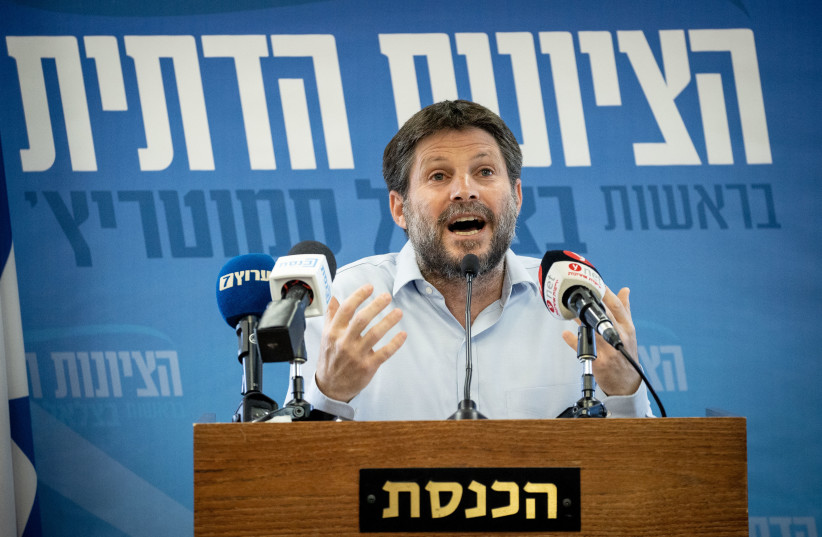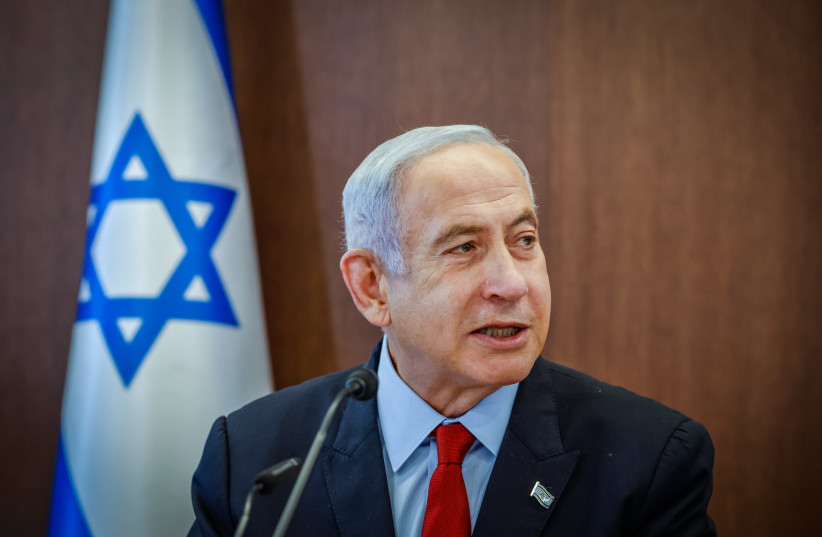Israeli and Palestinian officials discussed the resumption of security coordination and the temporary suspension of West Bank settlement announcements during a rare meeting hosted by Jordan’s King Abdullah in Aqaba on Sunday, according to a senior Israeli official.
The summit took place – with Egyptian and United States participation – as officials from the five governments pushed to halt the escalating Israeli-Palestinian violence and to prevent an even sharper outbreak during the month of Ramadan that begins on March 22.
The Palestinian shooting attack in the West Bank that claimed the lives of two brothers as the summit was taking place, and the Jewish extremist violence that followed, only underscored the urgent need douse the flames.
The US lauded the sheer success of bringing the two parties together, with Secretary of State Antony Blinken adding “it’s crucial for the parties to follow through on steps to de-escalate tensions and restore calm.”
US National Security Advisor Jake Sullivan added that “implementation will be critical” emphasizing that the summit was merely a “starting point” adding that “there is much work to do over the coming weeks and months to build a stable and prosperous future for Israelis and Palestinians alike.”

But the only clear conclusions from the summit appeared to be an agreement by all parties that violence must be halted.
Smotrich: The summit is meaningless
Finance Minister Bezalel Smotrich immediately dismissed the results of the summit as meaningless, noting that nothing substantive had occurred.
“I have no idea what they talked about or didn’t talk about in Jordan,” Smotrich tweeted.
“I heard about this superfluous conference from the media just like you. But one thing I do know: there will not be a freeze in the construction and development of settlements, not even for one day (this, on my authority). The IDF will continue to counter terrorism in all areas of Judea and Samaria without any limitation (we will confirm this with the cabinet). It’s very simple.”
His words highlighted the lack of clarity with respect to whether Israel had promised to make any substantive changes to its settlement policy.
Netanyahu: No settlement construction freeze
Prime Minister Benjamin Netanyahu clarified that it had not.
“There isn’t and there will not be any construction freeze” in Area C of the West Bank, he tweeted.
“Constructions and authorization in Judea and Samaria will continue according to the original schedule of the Higher Planning Council,” he said.
National Security Adviser Tzachi Hanegbi, who was part of the Israeli delegation reiterated that point and added, that there would be no “change in the status quo on the Temple Mount; neither is there any restriction on IDF activity.”
A joint communique put out by the five governments after the summit stated that Israel and the PA “confirmed their joint readiness and commitment to immediately work to end unilateral measures for a period of 3-6 months.”
It added, “This includes an Israeli commitment to stop discussion of any new settlement units for four months and to stop authorization of any outposts for six months.”
Among the central issues for the Palestinians has been Israel’s continued settlement activity. Israel’s security cabinet approved the transformation of 10 West Bank settler outposts into nine new settlements earlier this month. Last week, the Higher Planning Council for Judea and Samaria advanced plans for 7,000 new settler homes out of an anticipated package of 9,500 units the council is expected to advance.
Israel had announced the plans in response to the terror attacks this year that occurred prior to Sunday, which had already claimed 11 Israeli lives.
According to a high-level official, “there will be no change” to the decisions that were already taken to authorize nine settlements and to build 9,500 new housing units in Judea and Samaria.

Prior to the meeting, Netanyahu had promised the Biden administration that he would not authorize any additional settlements for six months. A senior Israeli official clarified after the Aqaba summit that “no additional decisions regarding the settlements are expected in the coming months” in a statement that appeared to indicate that there would not be any additional authorizations or advancement of plans beyond the 9,500 homes.
The communique also affirmed the commitment of the five governments to take steps to de-escalate violence and “to work toward a just and lasting peace.” It stressed the importance of upholding “the unchanged historic status quo at the holy sites in Jerusalem in word and practice,” and emphasized the special role of Jordan’s Hashemite Kingdom to those holy sites.” It was a reference that is meant to refer to the Temple Mount, known to Muslims as al-Haram al-Sharif or the Noble Sanctuary.
Failure to crack down on Palestinian terror cells
At issue for Israel has been the Palestinian Authority’s failure to crack down on Palestinian terror cells, while the PA wants the IDF to halt its military raids into its cities to root out those cells. The PA had halted security coordination with Israel in January to protest such raids.
At the Aqaba summit, officials agreed to establish a joint security committee to examine renewing security coordination between Israel and the PA, as well as PA willingness and ability to bear responsibility for the fight against terrorism in Areas A and B of the West Bank, a high-level Israeli official said after the meeting.
A second joint committee will be established to promote confidence-building economic measures to benefit the Palestinians, the official explained.
According to the Aqaba communique, “The participants also agreed to pursue confidence-building measures and strengthen mutual trust in order to address outstanding issues through direct dialogue. The two parties will work in good faith to assume responsibilities and to enhance mutual trust through this arrangement.”
A second summit of the officials from the five governments is expected to take place in Sharm e-Sheikh, Egypt, in the coming weeks, prior to the start of Ramadan.
Israel was represented at the meeting by National Security Adviser Tzachi Hanegbi, Shin Bet (Israel Security Agency) head Ronen Bar, the Coordinator for Government Activities in the Territories Maj.-Gen. Ghasan Alyan and Foreign Minister Director-General Ronen Levy.
White House Coordinator for the Middle East and North Africa Brett McGurk was present on behalf of the US.
The PA was represented by PLO Executive Committee Secretary-General Hussein al-Sheikh, General Intelligence Service head Majed Faraj, and Majdi al-Khaldi, a senior adviser to PA President Mahmoud Abbas.
The PA delegation had a list of requests including that the US re-open its Consulate General in Jerusalem and that Israel halts settler activity and Jewish extremist violence.
Sullivan said US President Joe Biden extended “his personal thanks to His Majesty, King Abdullah II, for convening this historic gathering, and for the personal efforts of President Abdel Fattah al-Sisi over recent weeks to establish the conditions for its success.”
He added that the “United States will continue to remain actively engaged in this format with all parties over the coming weeks.”
Omri Nahmias contributed to this report.
